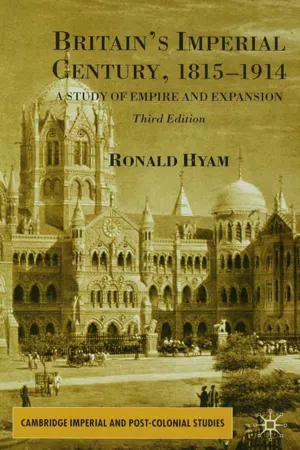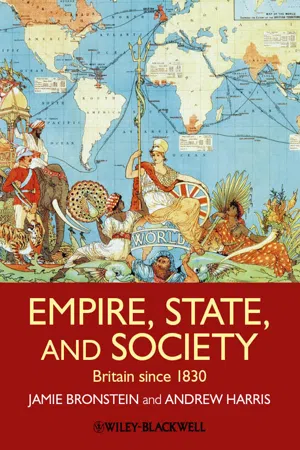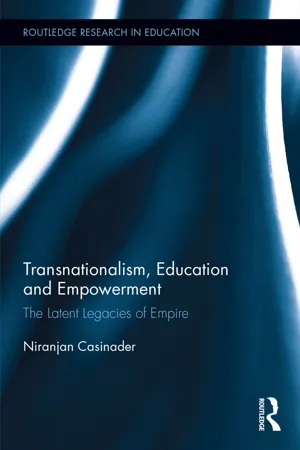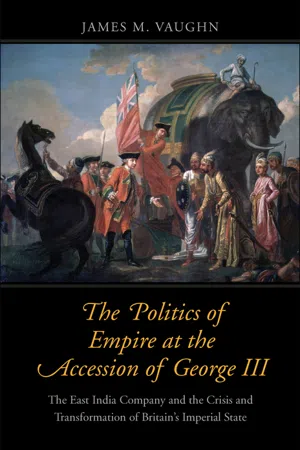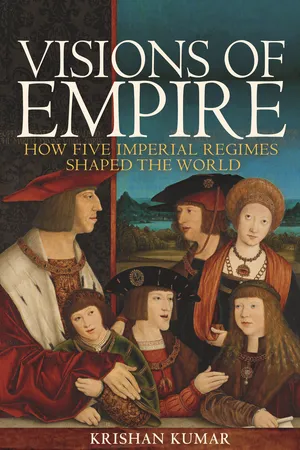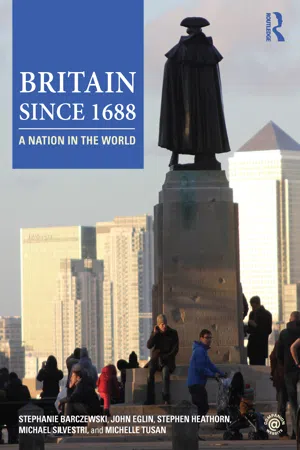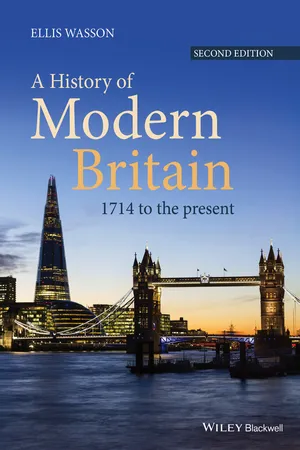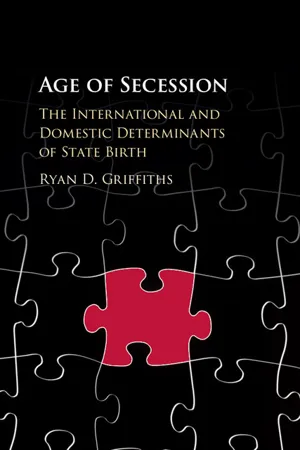History
British Empire
The British Empire was the largest empire in history, spanning over 20% of the world's land area at its peak in the early 20th century. It was established through colonization, trade, and military conquest, and had a profound impact on global politics, economics, and culture. The empire's legacy continues to shape the modern world in various ways.
Written by Perlego with AI-assistance
Related key terms
1 of 5
12 Key excerpts on "British Empire"
- eBook - PDF
Between Europe and America
The Future of British Politics
- Andrew Gamble(Author)
- 2017(Publication Date)
- Red Globe Press(Publisher)
The third phase of Empire was based on the colonies on the eastern seaboard of North America, but this Empire foundered when the colonies rose in rebellion and seceded from Great Britain and from the British Crown at the end of the War of Independence 61 in 1783. The focus of British attention then moved to India and to Africa, which became the heart of the fourth phase of Empire through the nine-teenth and twentieth centuries. This empire, the British Empire, was dubbed the expansion of England, but it was also an expansion of the multi-national British Isles. 2 At its greatest extent in the 1920s and 1930s it spread over one-quarter of the earthÕs land surface and contained one-fifth of its population. 3 By the end of the twentieth century little was left. 4 A loose association of former colonies in the Commonwealth and a miscella-neous collection of territories, some with no resident population, were all that remained of four hundred years of expansion; Anguilla, Bermuda, the British Antarctic Territory, the British Indian Ocean Territory, the British Virgin Islands, the Cayman Islands, the Falkland Islands, Gibraltar, Montserrat, Pitcairn Island, St Helena, South Georgia, the Turks and Caicos Islands. These thirteen territories had a combined population in 2000 of less than two hundred thousand people, enough to fill two medium-sized English towns. If the circle of Empire has shrunk so much in the last fifty years, does the Empire matter any more in British politics? The answer is that it still seems to matter a great deal. The late nineteenth century view of Empire may have lasted a relatively short period of time, but during that time it was extraordinarily intense, unlike earlier ideas of Empire which were much more narrowly focused and which excited much less passion. The Victorian conception of Empire by contrast touched every aspect of Bvitish life, and many English and British institutions and traditions were remodelled or invented to fit in with it. - eBook - PDF
Britain's Imperial Century, 1815-1914
A Study of Empire and Expansion
- R. Hyam(Author)
- 2002(Publication Date)
- Palgrave Macmillan(Publisher)
1 The Foundations of Power, 1815-1870 THE PROJECT OF AN EMPIRE When you come to think of it, there was no such thing as Greater Britain, still less a British Empire - India perhaps apart. There was only a ragbag of territorial bits and pieces, some remain- dered remnants, some pre-empted luxury items, some cheap samples. All that red on the map represented in truth at best only a dominion of opinion and a grand anomaly, and at worst a temptation to illusions of grandeur and a gross abuse. There was always a fundamental hiatus in the imperial bureaucratic pro- cess: the impossibility, in the last resort, of translating the demo- cratic political decisions of one society into the totally different political realities of another, the problem of producing any kind of real relation between policy determined in London and the practice of government on the spot. Before the coming of the telegraph, even the imperfect translation of will into act could in many places be a matter of years, or perhaps decades. There was also the problem of getting public support at home for the effective maintenance of the empire, for it was the public, not the policy-makers, who behaved with a 'fit of absence of mind' about the empire for much of the century. As the 15th Earl of Derby shrewdly remarked, 'Kings and aristocracies may govern empires, but one people cannot rule another'. British Empire and expansion was a set of aspirations and activities only loosely held together, chiefly by the defining limits and overshadowing realities of the American Republic and the Indian Empire. Between the challenge of the United States and the problem of India was hammered out all that was construc- tive in Britain's imperial century: for example, its insistent resort constitutionally to a federal panacea and its fitful concern moral- ly for humanitarian trusteeship. - eBook - PDF
A History of the British Isles
Prehistory to the Present
- Kenneth L. Campbell(Author)
- 2017(Publication Date)
- Bloomsbury Academic(Publisher)
The colonies in the British Empire helped to define not merely the empire but Britain itself by encouraging its people to become geographically aware of their place in the world and more culturally cognizant of the differences between themselves and their imperial subjects. This had not been the case in the eighteenth century. Although British involvement in India intensified after the collapse of the Mughal dynasty and Robert Clive’s victories at the time of the Seven Years War, the controlling power at the end of the eighteenth century in India was still the East India Company, not the British government. Furthermore, the British defeat in the American War for Independence seemed to suggest that the British Empire was contracting, not expanding. As the empire increasingly became a prominent part of British identity, the British viewed empire building not only as indicative of domestic greatness, but essential to their cachet on the world stage. In our own age, power and imperialism have acquired almost entirely negative connotations among many contemporary historians, but nineteenth-century attitudes towards empire were much more favourable. At the beginning of the nineteenth century, the British government had inherited a diverse and widely dispersed collection of colonies and global interests hardly deserving of the epithet ‘empire’, at least if that term means anything beyond the accumulation of individual territories, because no collective unity or connection among them existed. By the end of the Seven Years War in 1756, Britain had already acquired colonies in the Caribbean and the Mediterranean, while its North American colonies extended from Quebec to Florida. What did the Spanish settlers in Spain have in common with the French settlers in Quebec, or either of them have with the inhabitants of British possessions elsewhere? At this juncture the British thought of the members of their empire as ‘subjects’ who were fundamentally different from them. - eBook - ePub
Empire, State, and Society
Britain since 1830
- Jamie L. Bronstein, Andrew T. Harris(Authors)
- 2011(Publication Date)
- Wiley-Blackwell(Publisher)
Britain was more than just a disorganized collection of ancient nationalities and local governing bodies held together by a few strands of central government. It was also the center of an empire, and this had profound implications for its trade, its politics, its identity, and its culture. Even after the loss of the American colonies, Britain remained at war's end in 1815 the greatest imperial power in the world. Imperial concerns had played an increasing role in drawing Britain into military and naval conflicts throughout the eighteenth century, as imperial commercial connections came to be seen as more and more important and worth fighting for. Throughout the eighteenth century, Parliament, newspapers, magazines and public commentary focused on imperial topics: trade, war, governance, imperial architecture and foodways, and the racial, cultural and ethnic difference of “natives” everywhere.But the term “empire” meant not a single kind of colony, a uniform system of governance, or even similar motives for acquiring and developing different plots of land. It did not mean in this period that all imperial subjects spoke the same language or received the same attention from London. The defining feature of the empire was its variability. There were the colonies of primarily white settlement: British North America, and later Canada; Cape Colony; and the colonies that would later combine to form Australia. There was the collection of states, governed partly by the British government and partly by the privately owned East India Company, that would become India. And there were acquisitions through previous centuries’ war and piracy in the West Indies, the Caribbean islands dedicated to agricultural production through slave labor: Jamaica, Barbados, Trinidad and Tobago, and numerous smaller islands.Colonies provided significant amounts of some goods, usually raw materials; but they also provided Britain with the financial and shipping resources to do business in other parts of the world. Of the ten largest British imports in the late eighteenth century, half were from Europe and only three were colonial in origin: sugar (primarily from the West Indies), raw cotton (also primarily from the West Indies in this period), and manufactured cotton and silks (from India – though this was changing rapidly). Fifty years later, Britain still imported most of its second largest import, sugar, from the West Indies, but its largest import, cotton, now came from the United States. Another significant import was timber, one-third of which came from British North America, primarily Canada. Some 30 percent of British exports went to colonial possessions in the first half of the nineteenth century, primarily to the West Indies but also significantly to Canada and India. Britain also did a large export business with the former American colonies, and with Latin America, which had never been part of the British colonial sphere. - eBook - ePub
Transnationalism, Education and Empowerment
The Latent Legacies of Empire
- Niranjan Casinader(Author)
- 2017(Publication Date)
- Routledge(Publisher)
3 The British EmpireAn imaginary of dualities and contradictions
A The duality of empire
Compared to previous ages of world history, one of the singular features of the European period of imperialism, especially in the 18th and 19th centuries, was its symbiosis with the emergence of the sovereign state as the foundation of societal governance in the modern age (Benton, 2012, p. 1098). Concomitant with this relationship was the development of international law as a means of organising, or perhaps, more accurately, justifying actions of the more powerful and imperial of those nation-states (Koskenniemi, 2002). The historical and legal discourses have long agreed that European colonisation was a major driver and conduit in the creation of international law, which itself was utilised to justify the extension of European sovereignty over the external territories that each nation-state acquired (Anghie, 2005). In the postcolonial construction (for example, see Spivak, 1999), the process of extending the power of sovereignty that emanated from the metropole to lands and peoples that have been ‘acquired’ in the course of colonial expansion resulted in the creation of the imaginary of ‘civilisation’, in which colonisation had its embedded justification; the transport and distribution of Euro-American or ‘Western’ ideas about the construction and operation of human society to people and lands whose knowledge and understanding about the world lacked validity because of the very absence of European ideals: ‘… the work of civilization acquired direct rule and effective sovereignty for the European coloniser … ’ (Koskenniemi, 2002, p. 113). In establishing this imperial imaginary, the British Empire was no different from many of its contemporaries and predecessors across time and place. Alongside 19th-century European imperial powers such as France and Germany, the purpose of its imperial ambition had its initial roots in economic drivers, such as the acquisition of resources and the generation of trade (Cote-Meek, 2014; Said, 1993), or in strategic imperatives such as establishing a perceived secure and protected homeland centre. However, the long-term stability of imperial annexations depended ultimately on the transformation of minds, the regeneration of an existing society in a way that reinforced its new point of origin and encouraged a sense of imperial belonging: - eBook - PDF
The Politics of Empire at the Accession of George III
The East India Company and the Crisis and Transformation of Britain's Imperial State
- James M. Vaughn(Author)
- 2019(Publication Date)
The First British Empire, centered on commerce and the Atlantic, was replaced by the Second, more territorial and Eastern in focus. The new imperialism was characterized by autocratic gov-ernment, territorial conquest, and revenue extraction. The profoundly illib-eral features of British expansion during the later eighteenth and early nineteenth centuries were not merely detours on an otherwise evolutionary path of Whiggish progress; a path where the early modern “empire of the seas” led directly to nineteenth-century liberal, free-trade imperialism. “The British Empire from 1780 to 1830 (and in some areas beyond) represented not simply a hiatus between the irresistible waves of liberal reform,” C. A. Bayly persua-sively argues, “but a series of attempts to establish overseas despotisms which mirrored in many ways the politics of neo-absolutism and the Holy Alliance of contemporary Europe.” 4 Thus, the new imperialism marked a profound rupture with earlier forms of overseas expansion. What caused this rupture? Two overarching processes—the loss of the thirteen North American col-onies and the acquisition of an Indian empire—underpinned the transition to a new imperial formation. The former reconfigured the British Atlantic and dealt a severe blow to the long-standing maritime empire of trade and colonial settlement, and the latter heralded a new form of European imperial-ism. While commerce with the New World continued unabated after the War of American Independence, and colonial settlement was extended to new re-gions of the globe such as the Antipodes, the rise and consolidation of the British Indian Empire marked a truly epoch-making transformation of the European presence in Africa and Asia. The Second British Empire—which i n t r o d u c t i o n 3 was raised very much as an extension of, and in order to secure, the Raj—was a refutation of the long-standing British ideal of a maritime imperium of free association and exchange. - eBook - PDF
- Simon Potter(Author)
- 2017(Publication Date)
- Red Globe Press(Publisher)
Across the British Empire, who controlled what was never a simple matter and often a subject for debate. In this context, it is again useful to think about definitions. In writing about state power, some (but not all) historians draw a conscious and careful distinc-tion between the meanings of the words ‘imperial’ and ‘colonial’. ‘Imperial’ refers to the authority emanating from the London-based state apparatus in Whitehall and Westminster, and the coercive forces it was able to direct: the British Monarchy, Parliament and Cabinet; the Colonial Office, India Office, Foreign Office, and Treasury; the British Army, the Royal Navy, and so forth. ‘Colonial’ authority, on the other hand, refers to those elements of govern-ment and coercion that were based in the colonies themselves: governors and viceroys; colonial councils and assemblies; colonial civil servants; colonial army units, paramilitary police forces, and settler militias. Some of these colo-nial elements might have been despatched from London, and remained under London’s notional control. However, in reality they often proved difficult to manage from either Westminster or Whitehall. In an age when the rapid or regular movement of people and information was impossible, it could hardly have been otherwise. In the early nineteenth century, few policy-makers in London had any experience of the world beyond Europe. Later, railways and steamships made it easier for some to visit the colonies, and on their return to present themselves as experts with practical experience. However, their understanding of empire was often based on super-ficial impressions gathered during short stays overseas, and quickly became outdated. It was also difficult to generalize about the empire from experi-ences gathered in only one or two parts of it. Meanwhile, information and instructions travelled with frustrating slowness within the empire’s bounda-ries. - eBook - PDF
- Kevin R Cox, Murray Low, Jennifer Robinson, Kevin R Cox, Murray Low, Jennifer Robinson(Authors)
- 2007(Publication Date)
- SAGE Publications Ltd(Publisher)
I intend to explore how both historical geogra-phers of colonialism and scholars of contemporary geopolitics can contribute to a current debate on ‘Empire’ by connecting past and present in more meaningful ways. Rather then enter further into a discussion of definitions, then, I will, like many others, use the terms ‘colonial’and ‘imperial’rather loosely, to indicate where a given practice may lie upon a spectrum between actions taken by vari-ous interests in the colonies themselves (colonial) and those pursued by metropolitan governments (imperial). The fact that such projects were and are connected by networks linking the colonies to each other and to the metropole, and that such ana-lytical distinctions are thus not always realistic, is something that becomes clearer as the argument proceeds. THE REVIVAL OF EMPIRE The drawing of comparisons between the British Empire of the nineteenth-century and contempo-rary US imperialism has become a popular exercise of late. On the one hand, neo-liberals and con-servatives have sought to re-legitimate the notion of Empire and to advocate that the United States today follow in some of Britain’s imperial foot-steps. On the other hand, radicals have attempted to resurrect Empire as a category of critical analysis relevant to the contemporary, globalizing world. The British historian Niall Ferguson is a vocal contributor in the former vein. His conclusion (not necessarily warranted by the material that he presents very impressively elsewhere in his work) is that, despite its mistakes and its instances of bru-tality, overall, British imperialism was good for EMPIRE 457 the world because it made it ‘modern’ and glob-alized. More of the same kind of, by and large, beneficent, liberal suzerainty over contemporary globalization would be good from America today, if only its leaders could acknowledge such an impe-rial agenda explicitly and provide the resources and the political endurance necessary to pursue it (Ferguson, 2003, 2004). - eBook - ePub
Visions of Empire
How Five Imperial Regimes Shaped the World
- Krishan Kumar(Author)
- 2017(Publication Date)
- Princeton University Press(Publisher)
This was a time, we should remember, when Bryce, Cromer, and Lucas were also making their comparisons between the British and Roman empires, and like Cramb seeing in the British case an achievement that was likely to outrank Rome’s, and to ensure a longer lease of life, if not avoid decline altogether. We have been accustomed, from much of the recent literature, to write off the British Empire from the time of the early twentieth century onward, to see everywhere the signs of decadence and more or less imminent demise. Not only does that make mysterious its continued existence for another fifty years or more. It also ignores the plentiful evidence of the continued vitality of the empire, and a growing, not lessening, belief in its mission in the world. What it also passes over is the continuing evolution of the empire, and the fundamental rethinking as to its future that took place in the years before and after the First World War. The British Empire, it was argued, could and would survive; but it might need to change its form in order to do so.In the early decades of the twentieth century, a vast and ambitious policy of “education in empire” was conducted by a determined group of imperialists, among them C. P. Lucas, Hugh Egerton, A. P Newton, L. S. Amery, Sidney Low, and W. Pember Reeves. Many of these occupied senior academic positions—Lucas was a fellow of All Souls College, Oxford, Egerton the first Beit Professor of Colonial History at Oxford, Newton the first Rhodes Professor of Imperial History at London University, Pember Reeves the first director of the London School of Economics. Through a stream of publications, and with the aid of organizations such as the Royal Colonial Institute, the Victoria League, and the League of the Empire, this group sought to promote, in schools, universities, workingmen’s colleges, and even public venues such as the Albert Hall, an understanding of the empire, and of the vital role it was playing in the betterment of the world (Greenlee 1976, 1979; Grainger 1986: 190–92; Lee 2004).What was particularly important was that, though most of them acknowledged their indebtedness to Seeley, they refused to accept the restriction of Greater Britain to the white settler colonies. The British Empire was something greater than that, “a great and beneficial organism,” wrote Lucas, “unique alike in kind and extent, the result of growth to which no parallel can be found” (in Greenlee 1976: 274). In such an entity, which Lucas also likened to a great family, there was room for diversity as well as unity. Each part of the empire, however different its customs and culture from that of the metropolis, had its particular quality to contribute. Asia and Africa were as much part of this empire as Canada and Australia. What bound them together was membership of the same imperial family. Like children, even if when they grew up they went their own way, they would still be bound to the parent stock by the ties of affection and loyalty (Greenlee 1976: 276). - eBook - ePub
Britain since 1688
A Nation in the World
- Stephanie Barczewski, John Eglin, Stephen Heathorn, Michael Silvestri, Michelle Tusan(Authors)
- 2014(Publication Date)
- Routledge(Publisher)
Yet it is the case that the Second British Empire encompassed new lands and engendered new ideas about how the British ought to govern their overseas territories. In general, the lesson that Britain’s political leaders drew from the American Revolution was that their governance of the North American colonies had been too lenient. More authoritarian forms of government were thus developed. In Canada, for example, when colonial legislatures were established for Upper (Anglophone) and Lower (Francophone) Canada, they were made subordinate to a colonial governor appointed by Britain. In India, the military conquests of the East India Company continued into the early decades of the nineteenth century. The conquest of India raised major questions about the conflict between colonial expansion and British pride in the nation’s commitment to liberty for all its subjects, at home and overseas. “Plantation colonies” like those in North America and, later, Australia and New Zealand, were based upon the premise that British settlers would assume authority over a small, primitive, and therefore insignificant indigenous population, and were therefore easily envisioned as replica Britains in miniature. The British used the legal doctrine of terra nullius, which claimed that human beings had a right to territory that was not being properly utilized, to justify their encroachment upon these lands. Imperial expansion into Asia, however, required Britons to confront large populations and civilizations with very different social, cultural, and political attitudes and institutions from their own. In India, territorial control required conquest of the alien but obviously sophisticated Mughal empire, which occupied a land that was far from “empty.” This reality was difficult to reconcile with the contemporary belief that empires won by way of conquest would lead to a loss of political liberty not just for the conquered but for the conqueror - eBook - ePub
A History of Modern Britain
1714 to the Present
- Ellis Wasson(Author)
- 2015(Publication Date)
- Wiley-Blackwell(Publisher)
45 Little evidence, it is argued, points to the British public paying much attention to empire. Only the landed and commercial elites had a stake in the colonies in terms of jobs, trade, and status. For the rest of the population imperialism was irrelevant.Andrew Thompson wisely reminds us of the fragmentary and chaotic nature of the British Empire, that no single imperial vision ever existed even among the governing elite. All of the topics now attracting the notice of historians competed for, but none predominated in, a defined British identity.46 There is something akin to a search for the equivalent of a British version of the “Turner Thesis” (an analysis of “The Frontier” developed by Frederick Jackson Turner as a universal explanatory tool for American history) going on at the moment in the historiography of empire. As with Turner, reality is too complicated to accord with grand designs based on a single idea.The emphasis advocates of the “global turn” place on webs of connection throughout the world has been very helpful in explaining the expansion of trade and exchange of ideas. Just as those historians who called for a new British history that included Ireland, Scotland, and Wales, as well as England, deeply enriched our understanding of the archipelago, so too has John Darwin's idea of a “Britannic nationalism,” emergent in the later nineteenth century and continuing into the twentieth, that included not only the peoples of the archipelago but also Canadians, Australians, New Zealanders and other British settlers in the colonies. By 1900 a majority of English speakers lived outside the British Isles.47 - eBook - PDF
Age of Secession
The International and Domestic Determinants of State Birth
- Ryan D. Griffiths(Author)
- 2016(Publication Date)
- Cambridge University Press(Publisher)
Informal empire was a loose term that described the London’s prac- tice of interacting economically with other (weaker) sovereign states. Essentially, the UK used its superior military power to back up its eco- nomic contracts with the occasional show of force. As the British saw it, free trade required the occasional demonstration of power to ensure 19 Frieden 1994. 20 Lake 1999. 21 There were a significant number of states in these areas that were not regarded as sovereign equals by the great powers. See Griffiths and Butcher 2013 and Butcher and Griffiths 2015 for a discussion. The Expansion and Contraction of the British Empire 91 that markets remained open and contracts were fulfilled. When back- ing his policies, Lord Palmerston put it as follows: These half-civilized Governments such as those of China, Portugal, or South America, all require a dressing down every eight or ten years to keep them in order. Their minds are too shallow to receive an impression that will last longer than some such period and warning is of little use. They care little for words and they must not only see the stick but actually feel it on their shoulders before they yield to that argument which brings conviction. 22 The pejorative undertones aside, Palmerston’s comments illustrate an important point: during the first half of the nineteenth century, Lon- don could often pursue its economic policies without the accession of peripheral regions. 23 The metropole still engaged in accession, both indirectly with its protectorates and directly with its crown colonies, but the interstate rivalries of the late 1800s had not yet arrived. To use Doyle’s terms, there were both metrocentric and pericentric forces driv- ing British expansion, but the third element – systemic competition – was largely absent. 24 The cause of change in the late nineteenth century was interstate rivalry.
Index pages curate the most relevant extracts from our library of academic textbooks. They’ve been created using an in-house natural language model (NLM), each adding context and meaning to key research topics.

